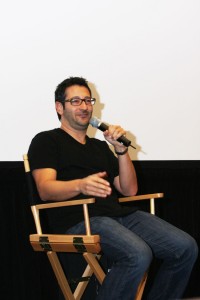Director highlights Hollywood’s unexpected twists
“Why do you want to be a filmmaker? Is it to tell great stories? Is it to move people? That’s kind of the question.”
Luke Greenfield said to an audience of aspiring movie directors, producers and writers on Tuesday night in the George Lucas Building at the USC School of Cinematic Arts.
Greenfield, who is best known for his work as the director of films such as The Animal and The Girl Next Door, came to USC to offer advice to students trying to navigate the behemoth that is the film industry. Screenwriter Nicholas Thomas, with whom Greenfield co-wrote The Last Bachelor, moderated the discussion.
Greenfield explained how he got his start in the movie industry. He began his career as a filmmaker when most other kids were busy playing in the park at age 10 after an uncle gave him his first video camera and he quickly began experimenting with the art of film.
Having decided early on that he would do everything possible to become a successful filmmaker, Greenfield set his sights on USC’s School of Cinematic Arts. After being accepted, he brought his talents as a young filmmaker from Connecticut to Los Angeles.
“I was an undergraduate here from 1990 to 1994 and we used to go to see all the people that would come in and talk,” Greenfield said. “I always wanted someone who could tell us honestly what it was like going through this actual program and getting out and making movies.”
Greenfield tried to do just that as he discussed his experiences at USC and how it was a valuable step toward his ultimate goal of becoming a Hollywood director. He spoke specifically of a film class where he was given the chance to direct his own short film, Alive & Kicking.
Greenfield’s next effort was a movie he co-wrote and directed called The Right Hook, a comedy about a loser trying to woo the girl of his dreams, which he screened for the audience during Tuesday’s discussion.
Students were given a chance to ask questions throughout the discussion and no one balked at the chance to ask Greenfield for advice on becoming a successful filmmaker.
One student asked about Greenfield’s time at USC and what he learned.
“Technically I didn’t learn much,” he said. “I think what was more valuable here was the people I had met and the people that were in my class, above me or below me in age.”
After his work on The Girl Next Door, Greenfield found himself with numerous offers to direct other movies but instead chose to develop a project of his own. What audiences today recognize as Role Models began as a project written by Greenfield called Big Brothers.
The director quickly illustrated how tough it can be to be a creator in Hollywood, as the studio that bought his script had a completely different idea in mind and transformed his idea into something very different.
“This movie Role Models had come out … it was a much different film than what I was trying to make. I was trying to do About a Boy, more grounded and more real and I was stuck,” Greenfield said.
Despite setbacks in his career, it was obvious that Greenfield’s foundation as a filmmaker was built on USC’s campus — where, he said, cinema students are exposed to top-notch equipment.
“Looking around this school though, the facilities you have here are pretty insane. I’m mixing a movie right now and [USC’s] mixing stages are just as good as Warner Bros.,” he said.
Although Greenfield was the focus of the event, he wasn’t the only one to speak. Thomas also offered his opinions on filmmaking, adding to Greenfield’s comments and sharing common experiences.
“I would say of the last 50 meetings we have been on, in 35 of them USC has come up some how some way,” Thomas said. “That’s the common bond.”
Ultimately, Greenfield offered advice that most people will only learn by struggling through the film industry and provided a rare glimpse into the life of a filmmaker who has stumbled, fallen and picked himself right back up again.
Before leaving the stage, Greenfield called on audience members to examine their dreams and formulate a plan on how to get there.
“You have to think about what road you want to take, why are you here?” he asked. “Why did you come to film school?”

